Tag: Originals
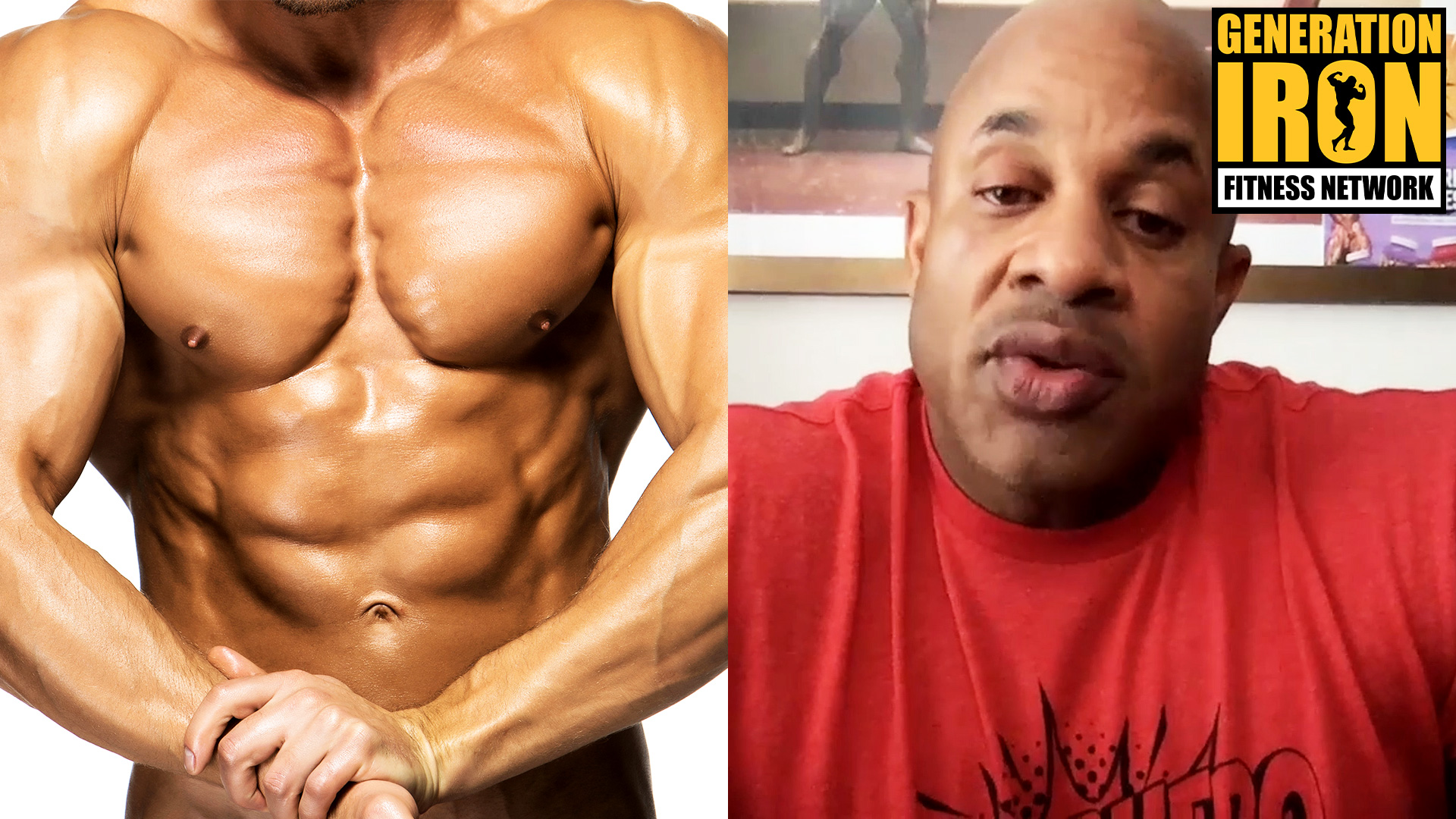
Victor Martinez: A Lot Of Bodybuilding Coaches Want To Be Dictators Over Athletes
[embedded content]
Victor Martinez talks about the importance of constructively questioning coach protocols… and how many coaches don’t want to be questioned
Health has been a heavy topic of discussion in bodybuilding as of late. This is due to an unfortunate string of deaths that passed through the industry over the past few months. While there is no real connection or deep evidence as to how many of these deaths happened – the specter of death looming over the sport has put health on a lot of people’s minds. So how do bodybuilding coaches play into this conversation? Are they responsible for the health of their clients? We asked this very question to pro legend Victor Martinez. In our latest GI Exclusive interview, Victor Martinez warns of coaches that want to be dictators over their athletes… and the importance of asking questions.
Over the years, there has been questions raised about the ethical relationship of coaches to athletes. It’s no secret that coaches provide protocols, not only of nutrition and training, but also recommended drug use. Some of these drugs are legally obtained without prescriptions… others are not. Coaches are not doctors though – so what happens if a protocol leads to health issues both long term and, potentially tragically, short term in the form of sudden hospitalizations or death? Is a coach responsible if something bad happens to an athlete under their supervision?
During our latest conversation with Victor Martinez, we asked him this very question. He believes that, while coaches are partly responsible, putting the full ethical blame on them is a scapegoat. His reasoning being that athletes know what is being recommended to them. They also know these coaches are not doctors. Martinez believes that athletes need to be responsible for themselves by doing their own research and asking questions. If an athlete blindly follows a coach’s protocol – they have no one but themselves to blame for bad outcomes.
“If a coach says ‘do this’ and you don’t question it, it’s your fault,” Victor Martinez states during our interview. He goes on to stress just how important it is for athletes to constantly ask questions.
Of course, he also understands that the system is not perfect. Victor Martinez admits that many coaches see themselves as dictators over their clients. They don’t want to be questioned. They are experts who should be trusted based on their reputation and name alone. It’s also part of the reason why some coaches get angry when an athlete leaves them for another coach.
“I know some coaches can be a little… a lot of coaches want a dictatorship. If you train with them, you’re great. You follow them. You leave them… they’ll fucking call you the worst athlete ever. Listen, if you’re training the athlete for free. By all means. Air out your grievance. But if the athlete is paying you. No. He’s allowed to leave you.”
Victor Martinez uses the word “dictatorship” to drive the point home. He’s not being literal but he does want to warn athletes that they shouldn’t feel trapped by their coach. If they think something is wrong in how they are being trained, for their health or otherwise, they should be able to leave without issue in a business relationship.
You can watch Victor Martinez talk in full detail about the ethics of coaching in our latest GI Exclusive interview segment above.
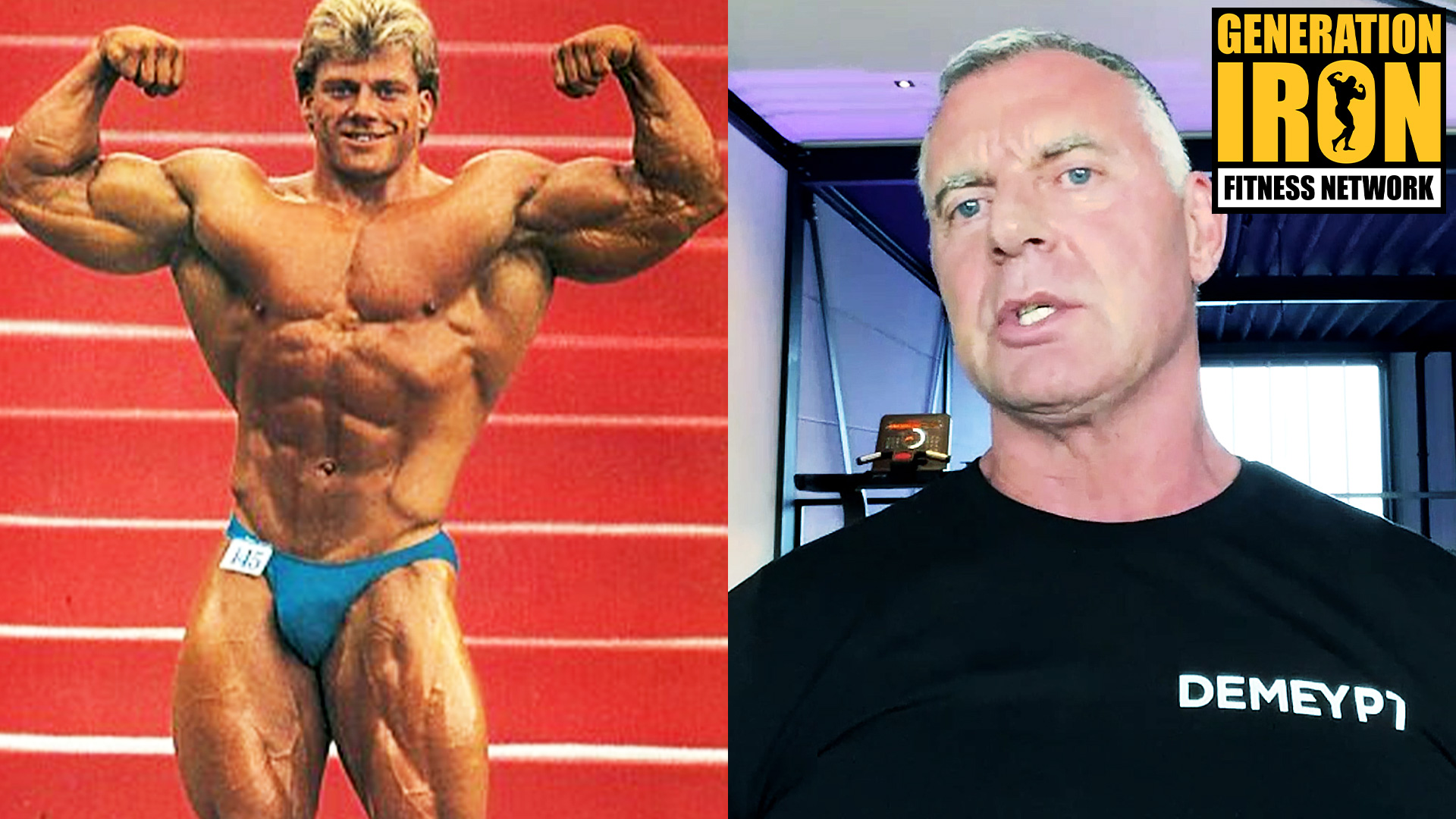
Berry De Mey: Matt Mendenhall Was The Most Talented Bodybuilder That Ever Lived
[embedded content]
Berry De Mey sings praises of bodybuilder Matt Mendenhall… so why didn’t he ever go pro?
Berry De Mey is a former pro bodybuilder and currently a well respected bodybuilding coach. His evaluation of physiques and the sport as a whole carries a significant weight due to his knowledge and insight into bodybuilding excellence. So when he calls a competitor one of the most talented that ever lived – it’s an eye catching statement. In our latest GI Exclusive interview, Berry De Mey explains why amateur bodybuilder Matt Mendenhall was one of the best bodybuilders of all time… and the likely reason he never went pro.
Beloved bodybuilder Matt Mendenhall sadly passed away earlier this year. He was a bodybuilder known for an immensely pleasing physique. But despite this, he never actually went pro in the sport. During our latest video conversation with Berry De Mey, Mendenhall’s name and memory were brought up. De Mey was quick to claim that, in his opinion, Mendenhall was one of the most talented bodybuilders that had ever lived. That’s a major statement – especially for a competitor who never ended up going pro.
So we asked Berry De Mey to speculate exactly why Matt Mendenhall never became a pro bodybuilder. If he was truly that talented, how could he have not made it into the elite ranks and at least tried to compete and win a Mr. Olympia? De Mey believes that, at the time, Mendenhall never brought in his conditioning enough to earn him a pro card. While his conditioning never came together, it was clear to De Mey that he could have gone the distance once he overcame that hurdle.
Berry De Mey had the pleasure of training with Matt Mendenhall for quite some time. During those training sessions, it became clear to De Mey that Mendenhall was a spectacular talent. Of course, hindsight is 20/20 – and looking back now, De Mey honestly believes that Mendenhall could have become an iconic and legendary pro in the sport. If he had only gotten that pro card, De Mey is confident that he would have become a Mr. Olympia champion.
Berry De Mey isn’t alone in this outlook of Matt Mendenhall. Over time, his name and physique had grown to legendary status despite never going pro. Upon his tragic passing, the bodybuilding community sent an outpour of tributes to the late great bodybuilder. A true testament to how memorable his talent was regardless of his status in the pro league. Perhaps in a different timeline – he would have been a Mr. Olympia great on the same level of Arnold Schwarzenegger, Dorian Yates, Lee Haney, or Ronnie Coleman.
When discussing the greatest athletes of all time, it’s easy to focus on statistics such as championship wins. But the truth behind all sports is that there is simply not enough room for all great talent to reach ultimate victories. It’s part of the beauty behind competition. There are a variety of factors that can determine who rises to the top and who doesn’t. In life, there have always been well deserved beloved figures and at the same time unknown genius talents that never get recognized until much later.
That’s why it’s so encouraging to hear a respected name such as Berry De Mey speak to Matt Mendenhall’s legacy. He might not have statistically been the greatest bodybuilder of all time – but in the hearts of many, he was one of the most talented bodybuilders that ever lived.
You can watch Berry De Mey speak in full about Matt Mendenhall in our latest GI Exclusive interview segment above.
Dr. Testosterone Warns: You Must Not Smoke Or Drink While On A Steroid Cycle
[embedded content]
Dr. Testosterone discusses the strict realities of combining steroids with other recreational drugs such as cigarettes, alcohol, cocaine, and more.
There’s no question that steroids are a major health risk when used recreationally for athletic enhancement. Whether an athlete wants to take that risk is up to the individual. But having as much information and education before making that decision is crucial for the athlete to make the right choice. That’s why Dr. Testosterone is crystal clear in his messaging regarding steroids and bodybuilding. He’s not against using the drug – but he’s not ignorant to the real and dangerous risks involved. This is especially true when considering the rest of your habits in relation to steroid use. In our latest GI Exclusive interview, Dr. Testosterone explains why athletes must not smoke cigarettes, drink alcohol, or use party drugs while on a steroid cycle.
When discussing any sort of drug use, the most challenging aspect for doctors and scientists is that these things do not happen in a vacuum. Asking if steroids are safe, for example, is more complicated than it seems. There are the inherent dangers of using such a powerful drug. But there are also dangers when considering other human habits that can go along with it. A doctor cannot control what we do outside of their office – they can only warn and suggest the right strategies for a healthy life.
Most bodybuilders understand the pros and cons of using steroids for athletic enhancement. What might be less known are the bad habits that can actually increase risk alongside the drug. Other things that we put in our body including the type of food we eat, other drugs we take, and also social drugs such as alcohol or cigarettes can all have a huge impact on the effect steroids put on our bodies.
During our conversation with Dr. Testosterone, we asked him how serious it is for a bodybuilder to continue other vices such as drinking or smoking while on steroids. Dr. T makes it very clear. He tells all of his patients that they much choose between steroids and. other drugs. He warns that a bodybuilder or athlete must not smoke cigarettes, drink alcohol, or use other drugs such as cocaine while on a cycle.
Dr. Testosterone warns that continuing to use these drugs alongside steroids, at best, will lead to worse results. At worst, it can amplify health dangers caused by both the other drugs and also the steroids. It’s the kind of cocktail that is not worth it. It’s these kinds of habits that can lead to bodybuilders becoming frustrated with results of steroids, for example, and then start taking higher doses in hopes of seeing results. This can be a slippery slope towards serious health issues.
Additionally, alcohol and cigarettes are already bad vices to have as an athlete. They make fitness simply harder, and can lead to degradation of your body that pulls away from your athletic ability. Add steroids into the mix and you are simply getting more negative effects than positive. No serious athlete should ever consider these things in combination.
You can watch Dr. Testosterone go into full medical detail by watching our latest GI Exclusive interview segment above!
*DISCLAIMER: Generation Iron does not recommend or condone the use of steroids or other PEDs. The views and opinions expressed in this video are not that of Generation Iron.
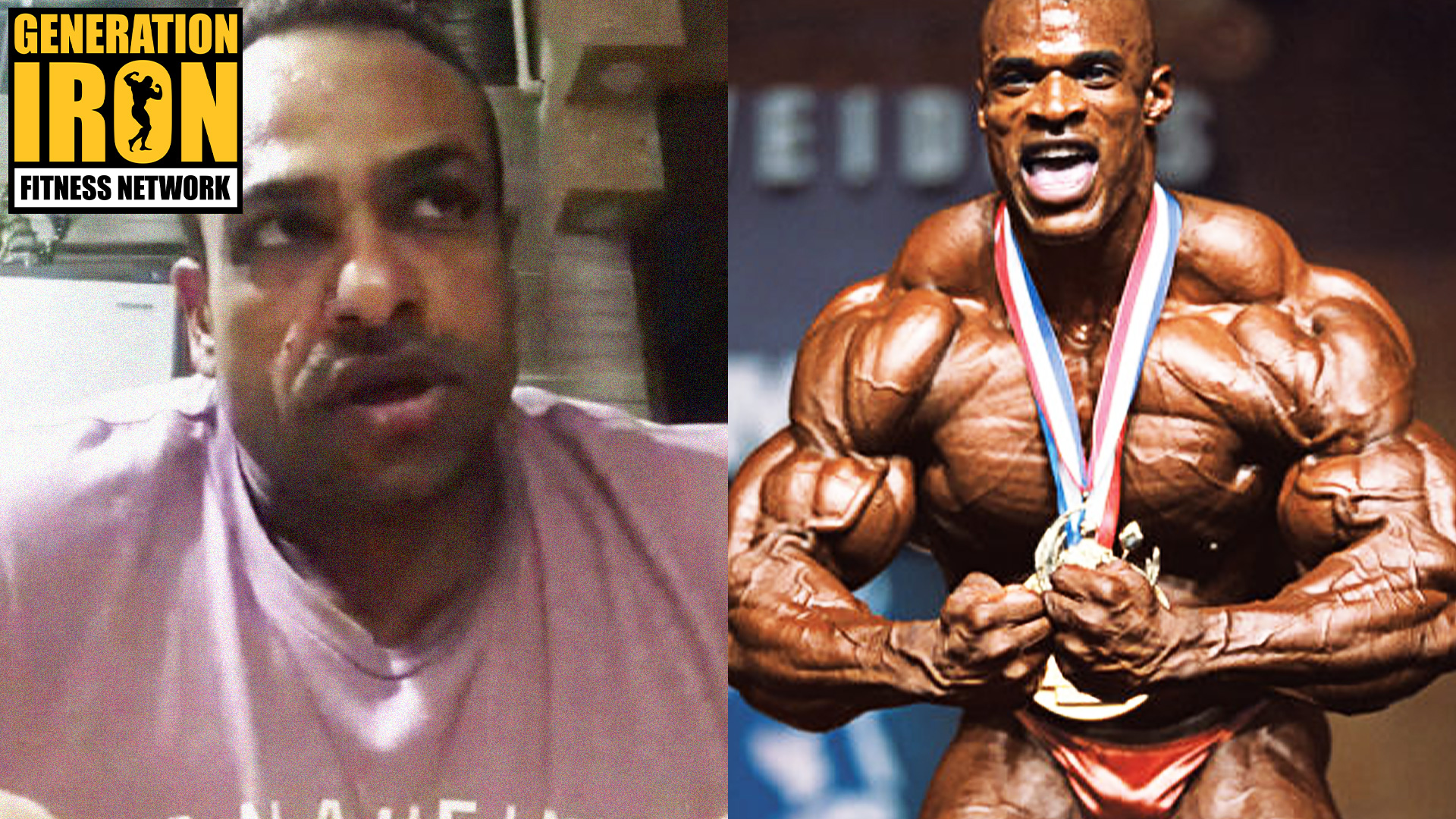
Mohamed El Emam: Ronnie Coleman’s Best Package Would Easily Win Olympia Today
[embedded content]
Mohamed El Emam believes no bodybuilder currently competing would be able to beat Ronnie Coleman at his best.
Whenever we have a chance to interview a pro bodybuilder for our GI Exclusives, we always ask them for their picks of the best bodybuilders of all time. Each person’s list can reveal some insight into their own goals and careers. At the same time, there is also often a commonality between each list. Certain competitors so impressive that they can’t be ignored. Ronnie Coleman is one of those athletes. For Mohamed El Emam, Ronnie is the absolute best of all time. He goes a step further by claiming that no modern bodybuilder today could defeat Ronnie in his prime. In our latest GI Exclusive, Mohamed El Emam claims Ronnie Coleman would easily win the Mr. Olympia today – including against current champ Big Ramy.
It’s no secret that Ronnie Coleman has the reputation as one of the sport’s best bodybuilders. That’s for good reason. Ronnie solidified the mass monster era and displayed a package so massive and so conditioned – that it seemed almost inhuman. To this day, few have been able to match that kind of shocking physique. It’s for this reason that Mohamed El Emam believes Ronnie is the single greatest bodybuilder of all time.
In fact, Mohamed El Emam believes that Ronnie Coleman’s physique is so impressive – that he would easily win the Mr. Olympia today if he were magically in his prime. That’s an example of how legendary Ronnie’s physique has become in bodybuilding. Some believe he has yet to be matched.
Big Ramy, our current and now two time Mr. Olympia champion, has often been compared to Ronnie Coleman. They both bring mass monster size (even compared to an entire division now packed with mass monsters). Both Ronnie and Big Ramy are unnaturally huge compared to the competition. In recent years, Ramy has also gotten his conditioning under control to look even closer to Ronnie’s impressive package during his prime years.
That being said, Mohamed El Emam cannot but Big Ramy on his list of best bodybuilders just yet. It’s only been a short while that Ramy has been champion – and it remains to be seen if he could maintain the conditioning needed to reign in the long term. El Emam believes that in five more years we can look back and more accurately evaluate Big Ramy.
Even still, Mohamed El Emam is very clear in his statement that Ronnie Coleman could “easily win the Mr. Olympia today.” That includes Big Ramy. So despite Ramy often being compared to Ronnie – El Emam still doesn’t quite put Ramy in the same category. In a way, that’s a major factor that’s been missing from the sport the past few years – a new mind blowing step forward in the form of a competitor.
In some ways, this makes for more exciting competitions. We’ve had more Mr. Olympia champions in the past four years than usual. Big Ramy just earned his repeat victory but before that each year brought us new champions including Shawn Rhoden, Brandon Curry, and most recently Big Ramy. There’s been no knockout champion. Even Ramy’s 2021 physique was a slight notch down from 2020. There were those who thought Brandon Curry would rise for revenge and reclaim his title. That didn’t happen – but the fact that it was close showcases how there is no “Ronnie Coleman level” monsters on the stage currently.
You can watch Mohamed El Emam break down his adoration for Ronnie Coleman in more detail (plus his other top bodybuilder picks) in our latest GI Exclusive interview segment above!
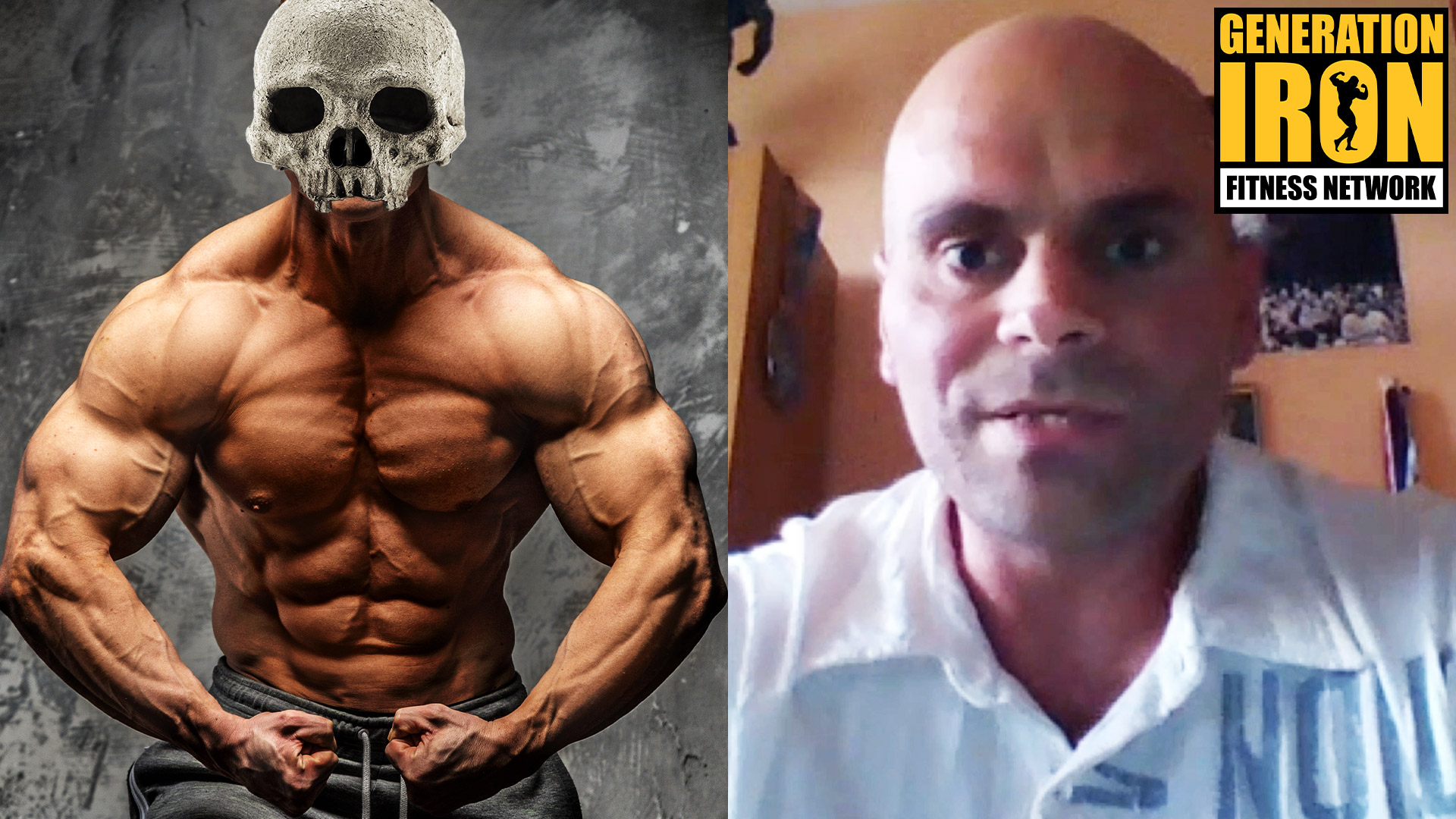
Lukas Osladil: “Young Bodybuilders Don’t Care About Their Health”
[embedded content]
Lukas Osladil makes a plea for younger bodybuilders to “stop and think” about their future health.
It’s a natural part of the human condition to be somewhat short sighted. Youth is wasted on the young – as they say. This holds true for health in bodybuilding. Young bodybuilders may feel immortal so they are more willing to push the boundaries of what is healthy in hopes of becoming a legend. Sadly, these actions might not have consequences until much later down the line of life. Lukas Osladil is a bodybuilder who has always tried to balance his health with the risks of Men’s Open bodybuilding. He notices many young bodybuilders are taking bigger risks – and fears for what that might lead to in the future. In our latest GI Exclusive interview, Lukas Osladil discusses health in bodybuilding and the different perspectives between young and older competitors.
Lukas Osladil made a pretty memorable statement during our video conversation: “I am always concerned for my health.” It’s a sort of self awareness that you don’t always see in competitive bodybuilders. Men’s Open bodybuilding can be risky – like many other pro sports that test the limits of human potential. Osladil has always made sure to put just as much effort into his health as he does into his training and growth as an athlete.
This is why Lukas Osladil takes larger breaks between competition cycles. He learned the trick from Kevin Levrone, who would often takes three months off from heavy bodybuilding training to reset. This is a tactic he’s recently took on after many years of no breaks. Osladil thinks more bodybuilders should do this. He thinks that living the bodybuilding lifestyle 24/7 is dangerous and will lead to health complications.
Lukas Osladil is also happily being trained by George Farah, who in his later years has emphasized health in bodybuilding more than his past self. Osladil would like to think his outlook helped influence Farah’s training style over the years. He’s not sure if this is true – but in either case, he’s happy with the nice fit they have as bodybuilder and trainer.
Osladil also understands the catch 22 of pro bodybuilding. Namely, that younger bodybuilders will always take greater risks. Unfortunately, those risks don’t show health consequences until years later – when it’s too late to go back. Older bodybuilders understand how their health has been effected – and so take more precaution. But for many it’s too late by that point. Is it possible to overcome the confident cockiness of young athletes?
Lukas Osladil isn’t sure if it can be changed but he wants to use his platform as a pro to urge young bodybuilders to be more careful. He sees bodybuilders dying all around him and worries that it will get worse. He hopes young competitors can get a wake up call and start playing it safer with their health.
You can watch Lukas Osladil’s full comments on bodybuilding and health risks in our latest GI Exclusive interview segment above!
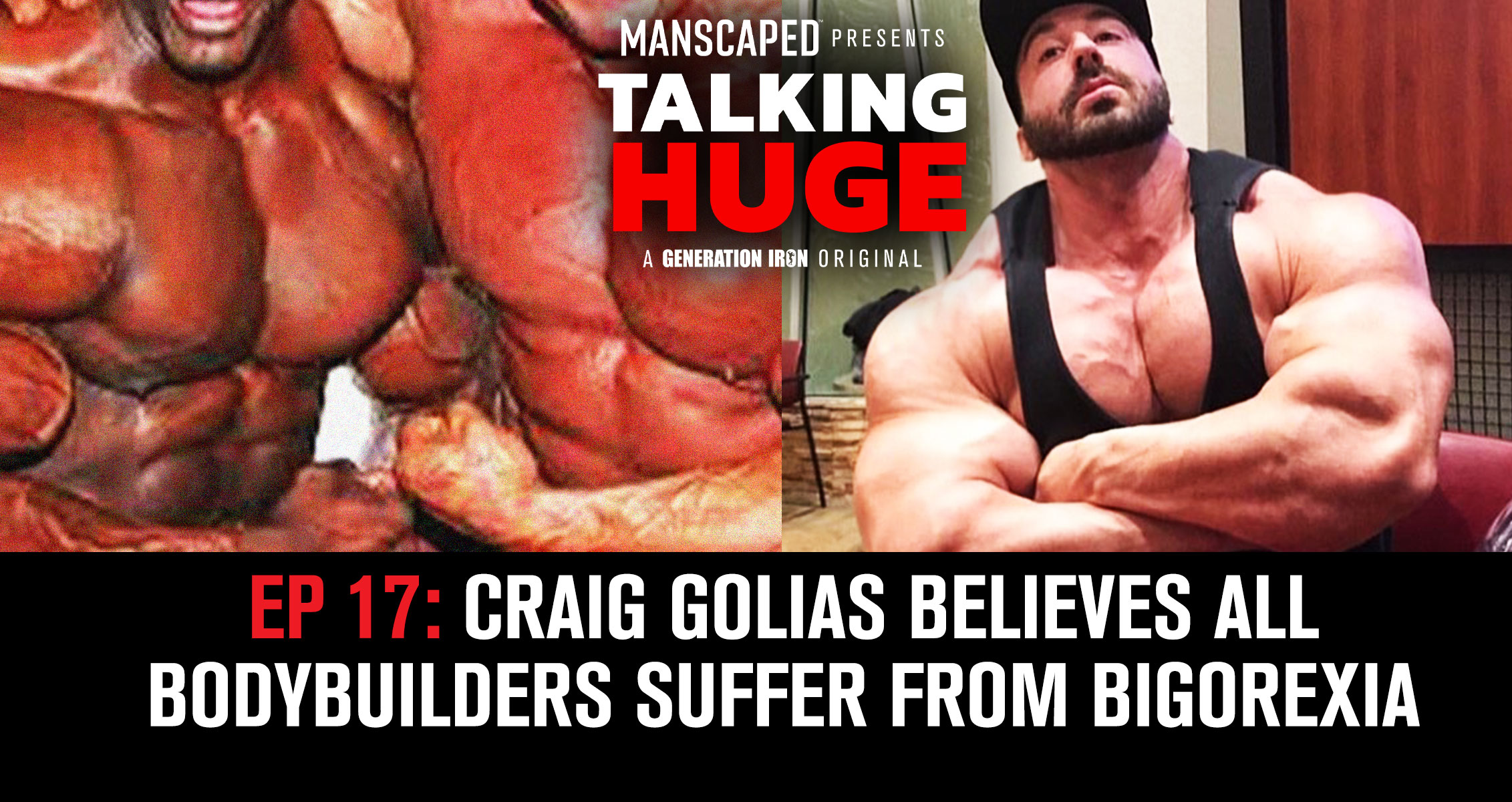
Talking Huge With Craig Golias | EP 17: All Bodybuilders Suffer From Bigorexia
[embedded content]
Craig Golias talks about the difference between hateful feedback and critical feedback and revisits his thoughts on bigorexia.
Welcome to another episode of Talking Huge – a weekly digital series in which Craig Golias talks in-depth with Vlad Yudin on the latest trending topics in bodybuilding. Raw, honest, and uncut – Craig Golias shares his opinions on all things bodybuilding. In this episode, Craig Golias talks about bodybuilding feedback – the difference between pure hate and actual constructive criticism. He also revisits the concept of bigorexia and how it affects bodybuilding.
Craig Golias was one of the featured athletes in our documentary film Bigorexia. The film explored the inner workings of those who never felt big enough – no matter how big they become. It’s been over a year since the film was released so we decided to reconnect with Craig about his thoughts on the film and also his own relationship with bigorexia as a mental disorder. We also discussed bodybuilding criticism of physiques – when is criticism constructive and when does it become opinionated hate. Let’s jump into it.
Hateful Feedback Vs Constructive Criticism In Bodybuilding
Bodybuilding is a subjective sport and is completely revolved around judging physiques. But far too often we’ve seen competitive bodybuilders get defensive about statements about their physiques. Whether it’s disagreeing with the judges or finding fan comments offensive – there is a fine line between actual criticism and hurtful feedback.
We asked Craig Golias his thoughts on bodybuilding criticism in the social media space. Golias is not a competitor but is a bodybuilding influencer. As such, he will sometimes share his opinions on pro physiques and results from major bodybuilding shows. He’s done just very that on episodes of Talking Huge recently. When does criticism become unwarranted in a world full of constant comments and notifications?
Craig Golias tries to separate the difference between opinion and criticism. Yes, both involve subjective viewpoints – but one is constructive while the other is just gut reaction. Not all opinion can be hurtful but it can more often lead to defensiveness from those receiving the opinion.
For example, saying a certain pro bodybuilder should not have won a show is opinion. Breaking down what they believed was flawed about their physique and how it could improve – that’s more constructive criticism. A bodybuilder is far more likely to be offended by being told they shouldn’t have won. They worked hard for that big win. A bodybuilder might get offended by more detailed criticism if they don’t agree – but far more often will take it in stride and perhaps learn from it. This is especially true when the criticism comes from a reliable source.
Craig Golias: All Bodybuilders Have Bigorexia
We also discussed with Craig Golias about his involvement in Bigorexia and reflecting on the film over a year later. More specifically, we discuss his relationship with bigorexia as a mental condition. Craig has no qualms admitting that he has bigorexia. In fact, he embraces it. You can argue that that’s part of the condition – that he doesn’t see it as a real issue with both good and bad effects on his life.
But Craig Golias attributes bigorexia to his success. His obsession with getting huge is what brought him sponsorship contracts and allowed him to become a personal trainer with a handful of clients. For Craig, the best parts of his life came from his obsession with being as big as possible.
He also goes on to say that all bodybuilders suffer from bigorexia. He believes that is the only reason any sane person would want to try being a bodybuilder. The amount of work, sacrifice, and risks that come with being a mass monster are too great for a completely logical person to stick with. Craig thinks that every bodybuilder sees someone too small in the mirror. Do you agree?
Wrap Up
There are far more topics discussed in this episode than we can cover in this article. Craig Golias also discusses the pros and cons of being an influencer and also muses over whether or not he would like to train pro bodybuilders for competitions. You can check it all out in the latest episode of Talking Huge above! Make sure to check out Talking Huge every week on Friday – only on the Generation Iron Fitness Network!

Gunter Schlierkamp Full Interview | Beating Ronnie Coleman, Bodybuilding’s Future & More
[embedded content]
Watch the full uncut GI Exclusive interview with Gunter Schlierkamp
Gunter Schlierkamp is a former pro bodybuilder who was known for his mass monster size. In fact, his size was so enormous it challenged Ronnie Coleman… and even beat him in one rare occasion after Ronnie was already Olympia champ. Now retired and dropped down in size – we reconnected with Schlierkamp to get his thoughts on modern bodybuilding and dive into his career.
Gunter Schlierkamp has been rather quiet and less engaged with the bodybuilding world. That’s why we were excited to land a video interview to get his opinion on how things have changed over the years and an first person account of his greatest accomplishments.
Over the past few months we’ve released multiple GI Exclusive segments from our interview with Gunter Schlierkamp. Now we’re releasing the full length interview including topics such as how he beat Ronnie Coleman, his critique on modern bodybuilding physiques, and his thoughts on Phil Heath’s Olympia reign – among other topics.
Listen To Our Gunter Schlierkamp Interview On The Generation Iron Podcast
Our full length interviews are now also in podcast form! Subscribe to the Generation Iron Podcast for candid, full length interviews with the biggest names in bodybuilding, fitness, combat, and strength sports.
Listen to the full Gunter Schlierkamp interview here:
Gunter Schlierkamp Answers: How He Beat Ronnie Coleman In His Mr. Olympia Prime
Gunter Schlierkamp is a bodybuilder who is beloved by many fans in the history of the sport. He may not have earned an Olympia win – but his mass monster physique was impressive and earned him a spot as an icon in bodybuilding. But there is one fact that might be shocking to fans who don’t know Schlierkamp’s career in detail. In 2002, just three weeks after Ronnie Coleman won his fifth Mr. Olympia title, Schlierkamp defeated Ronnie Coleman.
Of course, Ronnie Coleman had been defeated before. It’s well known that Coleman struggled to place high initially before dominating the field. That being said, after he started winning the Mr. Olympia year after year – Gunter Schlierkamp is the only bodybuilder to have defeated him during his reign. How did he do it?
We asked this very question to Gunter Schlierkamp during our latest video interview. His answer has little to do with some sort of mysterious trick – and more to do with continued hard work mixed with a boost of extreme confidence.
Gunter Schlierkamp faced off against Ronnie Coleman at a pro show in New Orleans three weeks after the Mr. Olympia. During the Olympia show – Schlierkamp placed fifth. This his first time making it into the top five at Mr. Olympia. Afterwards, famous bodybuilding journalist Peter McGough came up to him backstage. With extreme excitement, McGough stated that Schlierkamp should have placed in the top five the previous year. His placing in 2002 was vindication of the mistake that the judges made sleeping on him last year.
This news from such a trusted voice in bodybuilding made Gunter Schlierkamp ecstatic. So when he went into the New Orleans show just three weeks later – he had extreme confidence in his own ability going into the show. Not only that but he felt the energy of the fans. Any self doubt was thrown out the window. Mix that with continued hard work – and Schlierkamp found himself with the best conditioned physique he ever had.
Contest timing is always important as well. We asked Schlierkamp if he felt that Ronnie might have peaked at the Olympia only to be off three weeks later. Gunter Schlierkamp dismissed this idea. In his opinion, Ronnie Coleman looked better at the New Orleans show compared to the Mr. Olympia. By that notion, Schlierkamp believes to not have won by luck – but by pure hard work and will power. He didn’t defeat Ronnie on an off day. He defeated Ronnie at the top of his game.
Gunter Schlierkamp: It’s Dangerous For Young Bodybuilders To Get Too Big, Too Fast
We asked Gunter Schlierkamp about his thoughts on Big Ramy’s win and if it will push forward the trend of increasing the average size of pro bodybuilders. Gunter is unsure at the moment whether or not Big Ramy will reign as Mr. Olympia long-term. But he is a bit worried about the growing trend he’s seeing in modern bodybuilding. Less so about mass monster physiques in general and more about how its influencing younger athletes.
Gunter Schlierkamp understands that pushing the limits of size is part of bodybuilding – but he thinks that younger athletes are now rushing too fast to get there. Reaching a weight of near 300 pounds should be a slow process over many years. It shouldn’t be achieved short term. It seems, at least to Schlierkamp, that in today’s society of instant gratification – some young athletes want to reach the pinnacle faster than ever before.
Schlierkamp fears that this will lead to serious health issues. Again, he understands that mass monster physiques are a part of bodybuilding in the big picture. He knows all athletes take some risk to achieve it. But he’s convinced that rushing too fast at too young of an age almost guarantees serious health issues that could be avoided.
Gunter Schlierkamp reflects on Dallas McCarver, who passed away too soon at the age of 26. While it’s impossible to directly connect his cause of death to his mass monster size – Schlierkamp worries that this was the underlying cause.
He recounts a moment just before McCarver died – where he was asked on his opinion of the athlete. He admitted that his physique and size was astounding and impressive. But he also worried that he achieved it at such a young age that something bad would happen. Shortly afterwards, he heard the news of Dallas McCarver’s death. He was deeply saddened by not only the untimely death but the timing of his statement. Was he right? He worries so – and hopes that incoming bodybuilders take their time to build mass monster muscle rather than rush it.
Wrap Up
Gunter Schleirkamp discusses many more topics than what we can cover in this single article. He shares his thoughts on Women’s Bodybuilding and it’s return, Arnold Schwarzenegger, and Sylvester Stallon – among many other topics. That’s why you should check out the full GI Exclusive interview above! He shares his personal experience and tips for training, nutrition, and more.
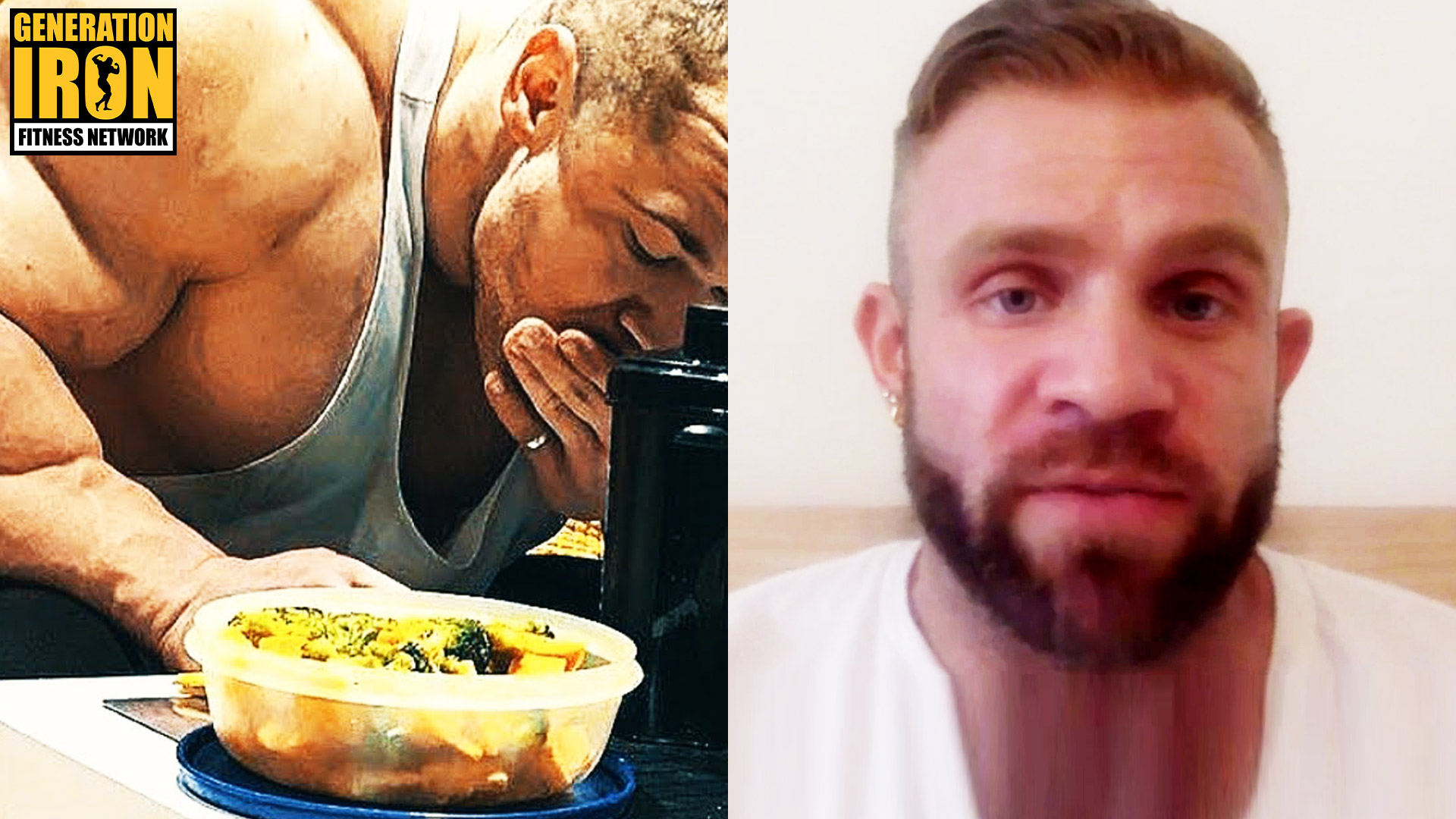
Iain Valliere: The Struggle Of Mass Monster Eating & Vital Tips For Hardgainers
[embedded content]
Iain Valliere discusses the often ignored struggle of eating mass amounts of food to reach pro bodybuilding size… and shares tips to improve your appetite.
Iain Valliere is a pro bodybuilder on the rise in Men’s Open. In 2021, he received much hype for his physique winning multiple shows throughout the year. He also placed 7th at the Olympia 2021. This is nothing to slouch at. That’s why we turned to him for advice that he could share with up and coming bodybuilders. During our discussion, the topic of diet, nutrition, and the challenge of eating high amounts of calories became a focus. In our latest GI Exclusive interview, Iain Valliere shares his personal struggles with eating like a mass monster and shares his tips for how to improve appetite.
Men’s Open bodybuilders are massive. There’s no getting around that. For fans of the sport, we might all be used to the mass monster size. But to the average person, these athletes look like freaks. That’s part of the appeal. But the reality is, even if it’s largely muscle, Men’s Open bodybuilders weight between 240-300 pounds on average. That’s a lot of weight. Training hardcore in the gym alone doesn’t build that kind of size. It takes a lot of food to build up that kind of weight as well. It’s a situation that Iain Valliere knows very well.
It’s no secret that most pro athletes consume far more calories than the average person. Bodybuilders fall on the most extreme side of this. In order to maintain 250 pounds of muscle, a bodybuilder needs to eat a lot. This is not natural for most people – even for most bodybuilders dedicated to the sport and lifestyle. In fact, Mr. Olympia champion Jay Cutler himself described a bodybuilder diet as force feeding.
During our conversation with Iain Valliere, we talked about bodybuilding diets and the struggle of eating mass amounts of food. Valliere revealed that he is naturally a hardgainer. When he graduated high school he only weighed 106 pounds. Putting on massive bodybuilding weight was always a challenge for him. Eating large amounts of food every day was basically a chore.
So what can a hardgainer do when they simply have no appetite to eat more food? What happens when the prospect of eating one more bite of anything disgusts them? We asked this question to Iain Valliere – and he had some vital tips to share.
First there’s the unfortunate truth, it simply takes time for you to physically and psychologically adapt to eating mass amounts of food. Iain Valliere admits he had more struggles when he first started. But consistency and constant effort into the sport simply rewires your mentality over time. It’s not going to make the early efforts any easier – but it does get better.
Thankfully, Iain Valliere also has some truly actionable tips to help increase your appetite. Many bodybuilders will avoid cardio during bulking season. This is due to the fear of cardio cutting away at muscle on top of the fat. Valliere has learned that cardio is actually necessary for bodybuilders – even during the off season. It doesn’t have to be hardcore cardio – but some aerobic action each day will increase your appetite. Valliere suggests talking a jog or walk after every meal. It will not burn too many calories – but help prevent bloating and fullness in the long run.
You can watch Iain Valliere explain his full experience with eating and his tips to increase appetite in our latest GI Exclusive interview segment above!
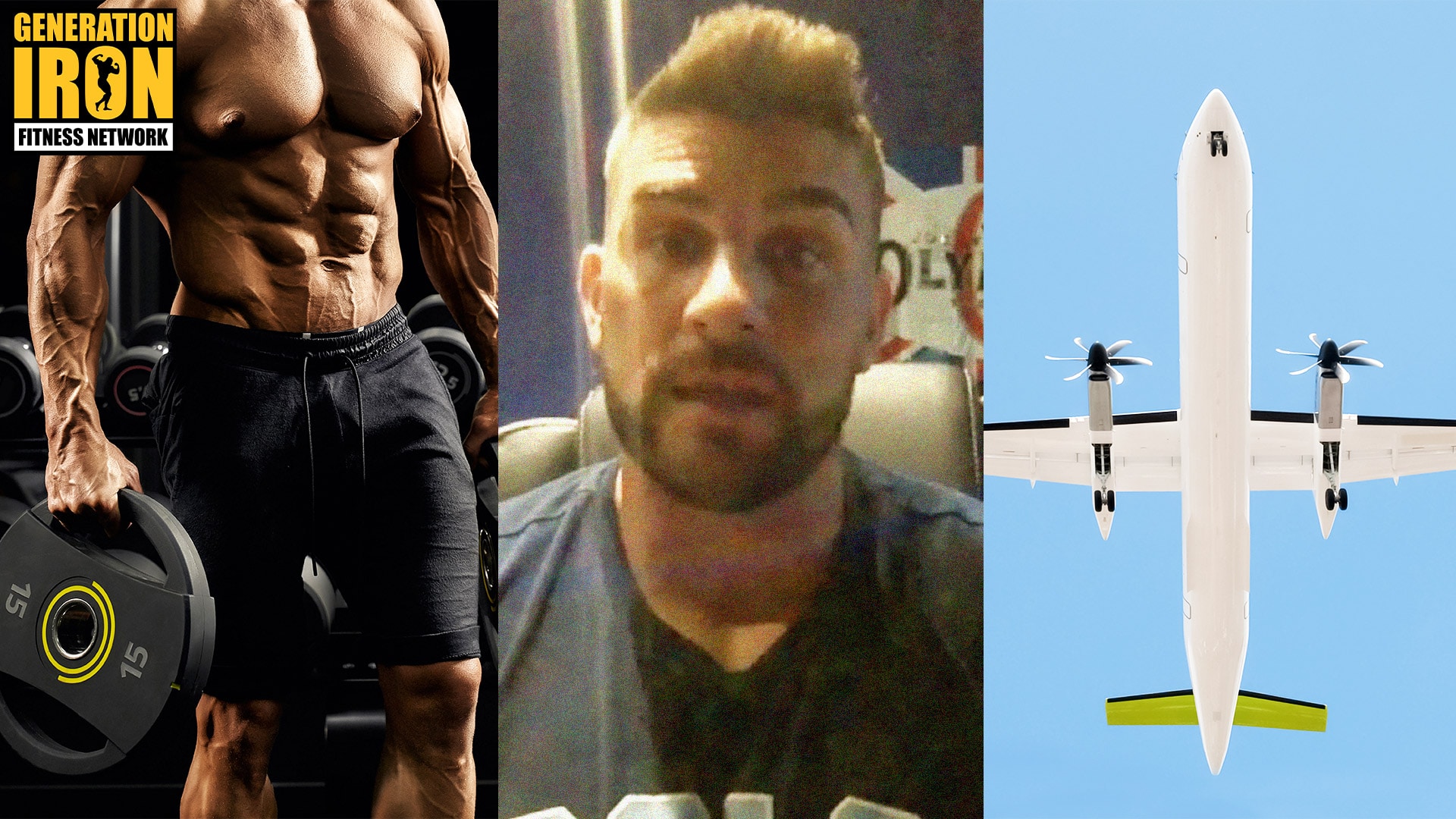
Ryan Terry: How To Prepare For Long Distance Travel Before A Bodybuilding Competition
[embedded content]
Ryan Terry shares the tips and tricks of preparing for long distance travel without ruining your bodybuilding diet and retaining too much water.
Ryan Terry is a pro bodybuilding competitor in the United Kingdom. Due to this – he often has to travel long distances for the biggest competitions of the year. The Arnold Classic and the Olympia, two of the biggest bodybuilding shows each year, both are held in the United States. This creates a mandatory 10 hour flight for Terry anytime he wants to compete at a major show.
This kind of long distance travel does not fit in with the structure needed for the daily bodybuilding lifestyle. When trying to look perfect for a competition – one 10 hour flight can throw off your peak timing right before a show. So how does a pro bodybuilder prevent disaster before appearing on stage? In our latest GI Exclusive interview, Ryan Terry breaks down his tactics for maintaining the necessary bodybuilding diet during long distance traveling before a competition.
It can’t be emphasized enough, a pro bodybuilder runs his or her body like a well oiled machine. Just like a machine, or say a car engine, everything must be kept in perfect condition to prevent issues down the road. This comes down to a daily level for bodybuilders – especially during the final weeks of contest prep. One wrong move can throw off peak timing. This means the athlete’s physique is off and a year of hard work is thrown out the window.
So when it comes to travel, a long flight can be a death knell for a pro bodybuilder right before a competition. Unfortunately, many pro bodybuilders must travel, sometimes across the globe, in order to compete in the best shows of the year. This is certainly true for Ryan Terry – who must usually travel at least 10 hours via plan to arrive in the states. During our video conversation, we asked for his personal tactics on maintaining his pinpoint diet and training alongside a flight throwing a wrench in traditional daily planning.
Ryan Terry acknowledges that a long flight can be disastrous for a bodybuilder. The 10 hours sucks up any time he could have been training and food options are limited. Also – staying seated on a flight for 10 hours can build up water retention in the body. This is the worst thing that can happen to a pro bodybuilder right before a show. That’s why Terry works backwards from landing in the United States – and plans out every single step of his travel plans well in advance.
It’s important to arrive early before a show – so that any problems that arise can be dealt with once settled in the competition location. Beyond this, Ryan Terry plans out his meal prep and his actions after landing off the plane by the minute. He looks up where nearby grocery stores are that fit his diet needs (usually Whole Foods), and plans out his trip step by step. He knows when he will land, when he will arrive at the grocery store, when he can get his first training session in a nearby gym.
By working backwards, he can then plan out the necessary meals to bring on the plan with him. Know if he needs to squeeze in a meal right before getting on a flight. He ensures that he eats the right kind of food to avoid water retention on the flight as much as possible. If it sounds like a lot – that’s because it is. The day of traveling requires the laser focus of a bodybuilder diet cranked up to 11.
You can watch Ryan Terry break down his travel prep in even more detail by watching our latest GI Exclusive interview segment above!
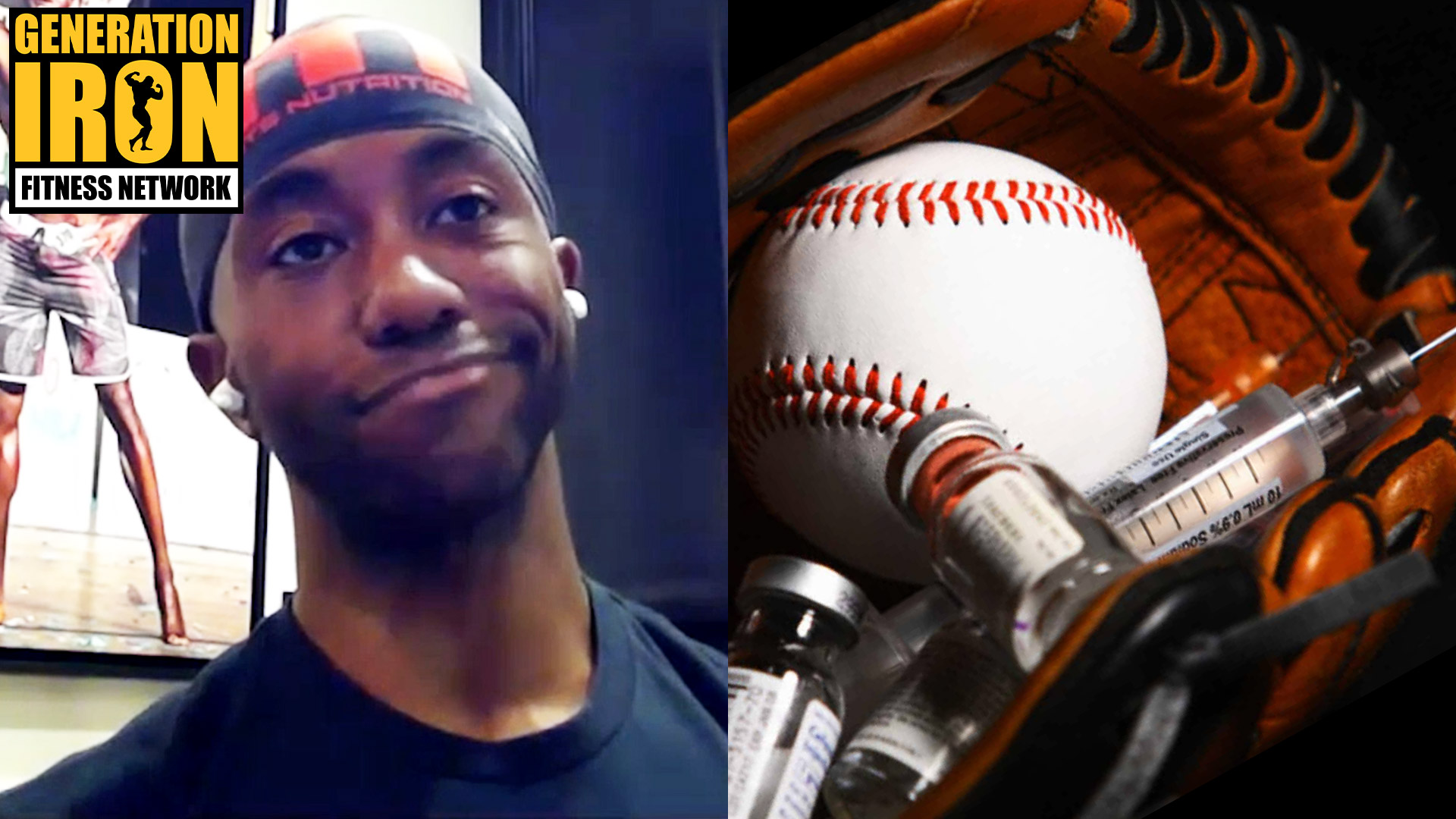
Colin Congo Answers: Are All Pro Sports Riddled With Steroids?
[embedded content]
Colin Congo compares pro bodybuilding to other sports when it comes to steroid use and policing of PEDs.
Colin Congo is a pro natural bodybuilder and also an active member in the FBI. This creates an interesting intersection between his personal beliefs about steroid use in bodybuilding – and the legal reality behind policing illegal steroid use in bodybuilding and other sports. The sport of bodybuilding is a strange beast in this way. Most leagues don’t actively test for illegal steroid use. That being said, it’s a general understanding that most pro bodybuilders use PEDs in order to reach the shocking level of muscular and size on display during contests. This fact, it’s argued, is what prevents a more mainstream version of success for the sport – such as being televised on mainstream broadcasts.
But there are those who point out that bodybuilding really isn’t any different from other pro sports. While different sports have different degrees of testing – it can be argued that almost all pro sports have athletes that use steroids and PEDs. The fact that Olympic teams such as Russia were the subject of wide spread steroid use seems to be proof that not everything can get caught (even if they do get caught eventually). That’s why we ultimately pulled on Colin Congo’s expertise as both a natural bodybuilder and a member of the FBI – do all pro sports really engage in consistent use of steroids? In our latest GI Exclusive interview, Colin Congo shares his take on steroid use across all pro sports, how it’s policed, and if it can ever really be stopped.
No matter the sport, it seems at some point in time the greatest athletes in sporting culture ultimately get caught for steroids or other PED usage. Lance Armstrong is a famous example, as well as MMA legend Jon Jones. Most recently, the entire Russian Olympic team was the subject of a in-depth documentary exposing wide-spread steroid use among its athletes. Different pro sports handle drug testing in different ways. But one thing that seems to remain true is this – pro sports cannot 100% police PED use. Even for the most lucrative leagues – it’s too expensive and too logically complicated to regularly test all athletes.
With this in mind, how often are pro athletes really using steroids? Pro bodybuilding often gets a bad rap for steroid use and its unwillingness to test for it. But is bodybuilding really any different to other pro sports that are far more popular? Baseball, Basketball, Football – all major sports have their own steroid scandals. Is steroid use simply unavoidable on a pro level?
We asked this very question to Colin Congo – a bodybuilder who has dedicated his life to being all natural and also is an active member in the FBI. While he has no way of knowing the truth behind all key athletes across all pro sports – he is able to use his anecdotal experiences between the FBI and natural bodybuilding as a foundation for the bigger picture. As far as Congo is concerned, the logic is sound – steroid use is most likely far more used in pro sports than many fans realize.
Colin Congo says that a combination of massive money on the line and an uneven playing field contribute to steroid use in pro athletes. If an athlete knows some are using steroids, that puts them at a disadvantage. So why not close the gap by using PEDs as well? On top of that, many pro athletes have their income directly related to their ability. When hundreds of thousands of dollars are on the line – the risk is suddenly becomes more worth it.
Colin Congo points out the irony for how reviled athletes become upon being caught for steroids. For example, Congo recounts Lance Armstrong having his entire reputation destroyed by being caught for PED usage. A friend and colleague of Congo’s took a look at the stats for other cyclists during Armstrong’s time. All of them were hitting close levels to Armstrong. After he was caught, in the years after those times and stats dropped significantly.
Congo’s take on that data? Many more cyclists were using the same drugs – but didn’t get caught. The reality is that Lance Armstrong was doing the same thing as all other athletes on his level. He got caught, his reputation is sullied, but really the entire sport’s reputation should take a hit. The problem is more endemic than media makes it out to be.
You can watch Colin Congo go into full detail about his thoughts on steroid use across all pro sports in our latest GI Exclusive interview segment above.
